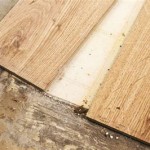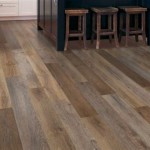Do I Need Underlayment for Vinyl Flooring on Concrete Floor?
If you're considering installing vinyl flooring over a concrete subfloor, you may wonder if you need underlayment. The answer is a resounding yes! Underlayment serves several essential functions that enhance the performance and longevity of your vinyl flooring.
Benefits of Using Underlayment
1. Moisture Protection: Concrete floors can be susceptible to moisture vapor transmission, which can damage vinyl flooring over time. Underlayment acts as a moisture barrier, preventing moisture from penetrating the flooring and causing warping or buckling.
2. Cushioning and Sound Absorption: Underlayment provides a layer of cushioning under the vinyl flooring, reducing impact noise and making the floor more comfortable to walk and stand on. It also absorbs sound, creating a quieter environment.
3. Insulation: Underlayment can improve the insulation properties of your floor, reducing heat loss and making your home more energy-efficient. This is especially beneficial in areas with extreme temperature fluctuations.
4. Leveling and Surface Preparation: If your concrete subfloor has minor imperfections or unevenness, underlayment can help level the surface and create a smooth base for vinyl flooring installation.
Types of Underlayment
There are various types of underlayment available, each with its own unique properties and benefits:
- Closed-Cell Foam: Provides excellent moisture protection, sound absorption, and insulation.
- Open-Cell Foam: More flexible and forgiving, providing good cushioning and impact resistance.
- Cork: A natural material that offers excellent sound absorption and insulation, as well as moisture resistance.
- Felt: A traditional choice that provides basic cushioning and sound absorption.
- Rubber: Very durable and water-resistant, making it ideal for areas with moisture concerns.
Installation Considerations
When installing underlayment over a concrete floor, it's important to:
- Clean the Surface: Remove any dust or debris from the concrete subfloor to ensure proper adhesion.
- Use a Vapor Barrier: Place a polyethylene vapor barrier under the underlayment if needed to prevent moisture transmission.
- Overlap Seams: When installing underlayment, overlap the seams slightly and tape them securely.
- Adhere the Underlayment: Use a suitable adhesive, such as thinset mortar or construction adhesive, to fix the underlayment to the concrete floor.
Conclusion
Using underlayment when installing vinyl flooring over a concrete floor is essential for protecting the flooring, enhancing its performance, and extending its lifespan. By providing moisture protection, cushioning, insulation, and leveling, underlayment ensures a durable, comfortable, and long-lasting floor that complements your home's décor.

Do I Need Underlayment For Vinyl Plank Flooring

Tips For Installing Vinyl Plank Over Concrete Floors Lemon Thistle

Choosing Underlayment For Vinyl Plank Flooring Your Ultimate Guide Jona Panel S Inc

Do I Need Underlayment For Vinyl Plank Flooring

What Underlay Is Required For Installing Vinyl On A Concrete Floor Mersey Flooring

Underlayment For Vinyl Flooring The Only Guide You Need Floor City

Vinyl Flooring Does It Need Underlayment Word Of Mouth Floors

Find The Right Underlayment For Your Luxury Vinyl Flooring

How To Install Vinyl Or Laminate Floors In A Basement Over Concrete Slab

Make Sure You Choose The Best Underlayment For Vinyl Flooring
See Also







